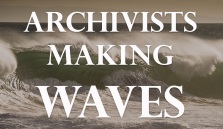Annelie De Villers, eScholarship Research Centre, University of Melbourne
Archivists deal with the storage, maintenance and accessibility of unpublished information and knowledge within our societies. Those who access archives down the track are influenced by the way in which the information is represented, therefore what we do has political and cultural ramifications.
Ever heard the phrase ‘history is written by the victors’? People who own knowledge or information have power over the way in which future generations remember certain events, or even, certain groups within society. Therefore archives can empower or disempower.
I work as a research archivist at the University of Melbourne’s eScholarship Research Centre. The majority of the time I am lucky enough to I work on a project called ‘Return, reconcile, renew: understanding the history, effects and opportunities of repatriation and building an evidence base for the future’.
The Return, Reconcile, Renew project records the history…
View original post 831 more words


 Why do volunteers choose to contribute thousands of unpaid hours per week to Australian archives? This paper presents the results of a nationwide web survey that provides insight into the demographics, motivations, and experiences of volunteers in Australian archives.
Why do volunteers choose to contribute thousands of unpaid hours per week to Australian archives? This paper presents the results of a nationwide web survey that provides insight into the demographics, motivations, and experiences of volunteers in Australian archives. What does the Copyright Amendment Bill actually mean for archivists and archival organisations? Jessica Coates of The Australian Libraries and Copyright Committee was generous enough to answer my questions.
What does the Copyright Amendment Bill actually mean for archivists and archival organisations? Jessica Coates of The Australian Libraries and Copyright Committee was generous enough to answer my questions. I recently became excited when I learned that an Australian Information Management undergrad course contained subjects about research. This excitement dampened considerably when I was told the intent of the subject was to teach future information professionals about how to support the research activities of others, rather than to conduct research of their own.
I recently became excited when I learned that an Australian Information Management undergrad course contained subjects about research. This excitement dampened considerably when I was told the intent of the subject was to teach future information professionals about how to support the research activities of others, rather than to conduct research of their own. This year I will be partaking in the
This year I will be partaking in the  Being a new archival professional is terrifying. You are scared of stepping on toes, of being viewed as competition, of making a fool of yourself. Often this means that we hesitate to step out of our comfort zones.
Being a new archival professional is terrifying. You are scared of stepping on toes, of being viewed as competition, of making a fool of yourself. Often this means that we hesitate to step out of our comfort zones.
 For most archivists, research continues to be shrouded in mystery. Unfortunately this contributes to the
For most archivists, research continues to be shrouded in mystery. Unfortunately this contributes to the  If the Care sector recognised that their records were evidence of a child’s life and therefore formed part of that child’s personal recordkeeping the nature of their records would be very different. This post is a re blog of the post I wrote for the
If the Care sector recognised that their records were evidence of a child’s life and therefore formed part of that child’s personal recordkeeping the nature of their records would be very different. This post is a re blog of the post I wrote for the  UPDATE: THIS STUDY HAS CONCLUDED. RESULTS ARE FORTHCOMING.
UPDATE: THIS STUDY HAS CONCLUDED. RESULTS ARE FORTHCOMING. Social media presents us with the opportunity to collaborate with one another, in accessible language which not only increases the reach and impact of your ideas, but also fosters collaborative opportunities. Aligning our professions’ research activities with industry requirements would be to the benefit of us all.
Social media presents us with the opportunity to collaborate with one another, in accessible language which not only increases the reach and impact of your ideas, but also fosters collaborative opportunities. Aligning our professions’ research activities with industry requirements would be to the benefit of us all.
 The irrefutable strength of social media is in its ability to break down barriers. We usually talk about this quality in terms of social media’s ability to overcome issues of time and space, but in this post I want to focus on its’ ability to overcome barriers between groups; say… between researchers and practitioners in the Australian archival sector.
The irrefutable strength of social media is in its ability to break down barriers. We usually talk about this quality in terms of social media’s ability to overcome issues of time and space, but in this post I want to focus on its’ ability to overcome barriers between groups; say… between researchers and practitioners in the Australian archival sector. Last week I attended a lecture by
Last week I attended a lecture by